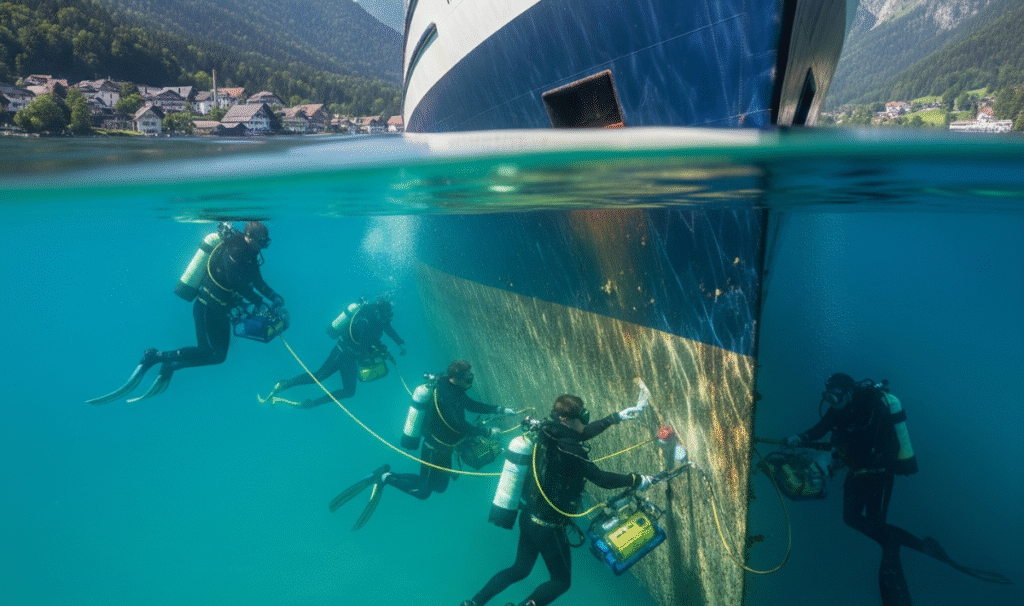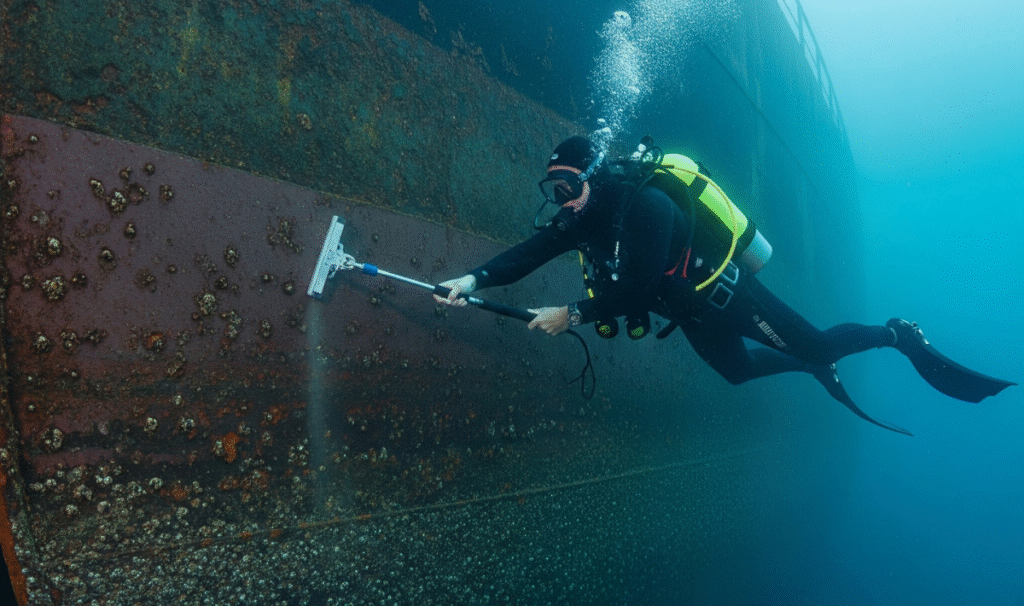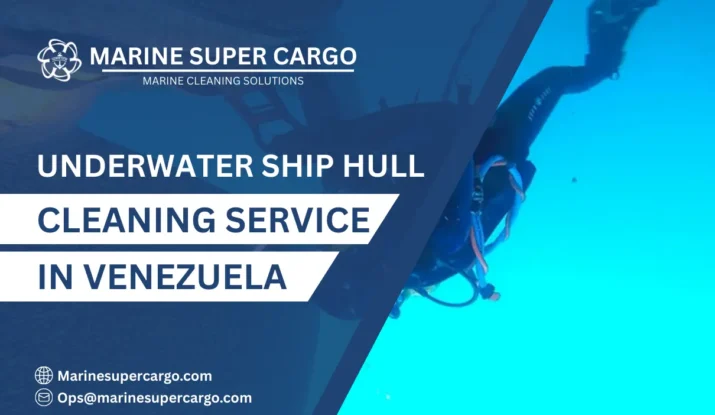When you imagine the Caribbean Sea, the coastlines of Venezuela often come to mind—lively ports, turquoise waters, and busy shipping lanes connecting South America to the wider world. But beneath every vessel traveling these waters lies a hidden challenge: biofouling. Barnacles, algae, mollusks, and other organisms cling to ships, creating resistance and inefficiencies. This is why underwater ship hull cleaning in Venezuela isn’t just maintenance—it’s vital for operational efficiency, environmental compliance, and vessel preservation.
Venezuela is geographically blessed with prime shipping routes, ports like Puerto Cabello and La Guaira, and easy access to global trade lanes. Yet, these waters are also host to marine organisms eager to make a ship’s hull their new home. Just as you wouldn’t let dust collect on your house windows until it blocks sunlight, ignoring marine growth on a ship hull can create huge problems.
This article dives into the three key benefits of underwater ship hull cleaning in Venezuela, helping you understand why it should be an essential part of regular maritime maintenance.
What is Underwater Ship Hull Cleaning in Venezuela?
In the simplest terms, underwater hull cleaning is like bathing a ship. It involves divers or robots removing algae, barnacles, and other marine organisms from the ship’s submerged surfaces.
- Traditional methods included divers with hand tools, scrubbing manually.
- Modern techniques now use ROVs (Remotely Operated Vehicles), hydraulic brushes, and eco-friendly suction systems.
Organizations such as the International Maritime Organization (IMO.org) and International Marine Contractors Association provide critical safety and environmental guidance to ensure this practice benefits ships without damaging marine ecosystems.

Improved Fuel Efficiency and Reduced Costs
Imagine running a marathon with weights tied around your ankles. That’s exactly what biofouling does to ships. A fouled hull increases drag, forcing engines to work harder and consume more fuel.
This has massive cost implications for vessels traveling through Venezuelan waters. Research shows that fouling can push up fuel consumption by 10–40%, which translates into hundreds of thousands of dollars annually for large cargo ships.
By scheduling underwater ship hull cleaning in Venezuela, operators gain:
- Lower fuel costs – smoother hulls mean less drag and more efficiency.
- Competitive advantage – faster turnaround in busy ports like La Guaira.
- Reliable schedules – reduced delays caused by slower speeds.
It’s like upgrading from muddy sneakers to running shoes—you instantly notice the difference.
Environmental Protection and Compliance
Fuel savings also mean a cleaner planet. Cleaner hulls lower reliance on heavy fuel oil, which means fewer greenhouse gases are emitted. For a country like Venezuela, whose ports are vital transit points, maintaining eco-compliance is key.
As MARPOL, the international community is serious about pollution prevention. Regular underwater ship hull cleaning in Venezuela ensures that:
- Ships stay compliant with MARPOL rules.
- Emissions of nitrogen oxides and sulfur oxides are reduced.
- Invasive alien species aren’t transported in Venezuelan waters.
Left unchecked, biofouling spreads non-native organisms from one geography to another. This threatens biodiversity in Venezuela’s Caribbean ecosystems, which is exactly why IMO authorities emphasize hull cleaning as a preventive measure.
Longer Vessel Lifespan and Enhanced Safety
Think of your ship as a fortress. Over time, fouling doesn’t just slow it down—it attacks the walls. Marine organisms accelerate corrosion and damage protective coatings. Left untreated, it’s like termites chewing through wooden beams.
Routine underwater ship hull cleaning in Venezuela provides:
- Better corrosion control – extending the life of steel hulls.
- Stronger coatings – antifouling paints perform more effectively.
- Improved handling – ships maneuver more safely in Venezuela’s narrow ports.
For the crew, this means safer voyages with reduced risks of accidents caused by sluggish maneuverability. For operators, it’s fewer drydock bills and an extended service life of the vessel.
Challenges of Hull Cleaning in Venezuela
While beneficial, hull cleaning in Venezuela brings unique challenges:
- Regulatory hurdles – Permits and compliance with local environmental regulations.
- Port conditions – Busy hubs like Puerto Cabello require scheduling coordination.
- Weather factors – The Caribbean Sea can present unpredictable conditions, affecting cleaning operations.
Shipowners need trusted providers who know these waters and follow both local and international regulations.
Technological Innovations in Hull Cleaning
Hull cleaning is no longer just about divers with brushes. The industry is evolving with:
- Robotics and ROVs – safer, faster, and more efficient cleaning.
- Eco-friendly coatings – advanced hull paints that resist fouling.
- Sustainable methods are advocated by groups such as iaphworldports.org.
These advancements are particularly important in Venezuelan waters, where ecological preservation is closely tied to economic and social well-being.
Choosing the Right Service Provider in Venezuela
Not all hull cleaning providers are equal. If you’re considering underwater ship hull cleaning in Venezuela, here are key factors to check:
- Certifications – ensure compliance with IMO and IMCA standards.
- Eco-compliance – ask how waste and debris are managed.
- Experience – proven knowledge of South American waters is essential.
- Technology use – ROVs and non-toxic cleaning systems guarantee better results.
Choosing wisely ensures you’re not just cleaning your hull—you’re protecting your investment and Venezuela’s marine ecosystems.

Summary of the Three Key Benefits
To quickly recap, here are the 3 major benefits of underwater ship hull cleaning in Venezuela:
- Fuel efficiency and financial savings – less drag equals less fuel.
- Environmental compliance – fewer emissions, no invasive species spread.
- Vessel preservation and safety – achieving longer hull life and safer operation.
Conclusion
At the heart of shipping lies a simple truth: what lies below the surface defines success above it. By investing in underwater ship hull cleaning in Venezuela, you save on costs, safeguard the environment, and extend the strength and safety of your valuable vessels.
Think of it as polishing the unseen armor of your ship, ensuring it cuts through Venezuelan waters smoothly, reliably, and sustainably. For trusted, professional, and eco-friendly services, shipowners can rely on CleanShip.co—a partner committed to efficiency, compliance, and marine responsibility.
FAQ:
Q1: How often should underwater hull cleaning be done in Venezuela?
Most ships schedule cleaning every 6–12 months, depending on trade routes and fouling intensity in Caribbean waters.
Q2: Can hull cleaning harm local marine life?
If performed improperly, yes. But when services follow IMO and IMCA guidelines, the process minimizes risks and even helps preserve ecosystems.
Q3: Does hull cleaning reduce carbon footprint?
Yes. By lowering fuel consumption, ships release fewer emissions, directly reducing their carbon footprint.
Q4: Is underwater ship hull cleaning in Venezuela cost-effective for small operators?
Absolutely. Even fishing and mid-sized cargo vessels benefit from savings and extended vessel lifespans.
Q5: What new technologies are used in Venezuela for hull cleaning?
Robotic cleaners, ROV systems, and eco-friendly coatings are gaining popularity, offering safer, faster, and more sustainable cleaning.


